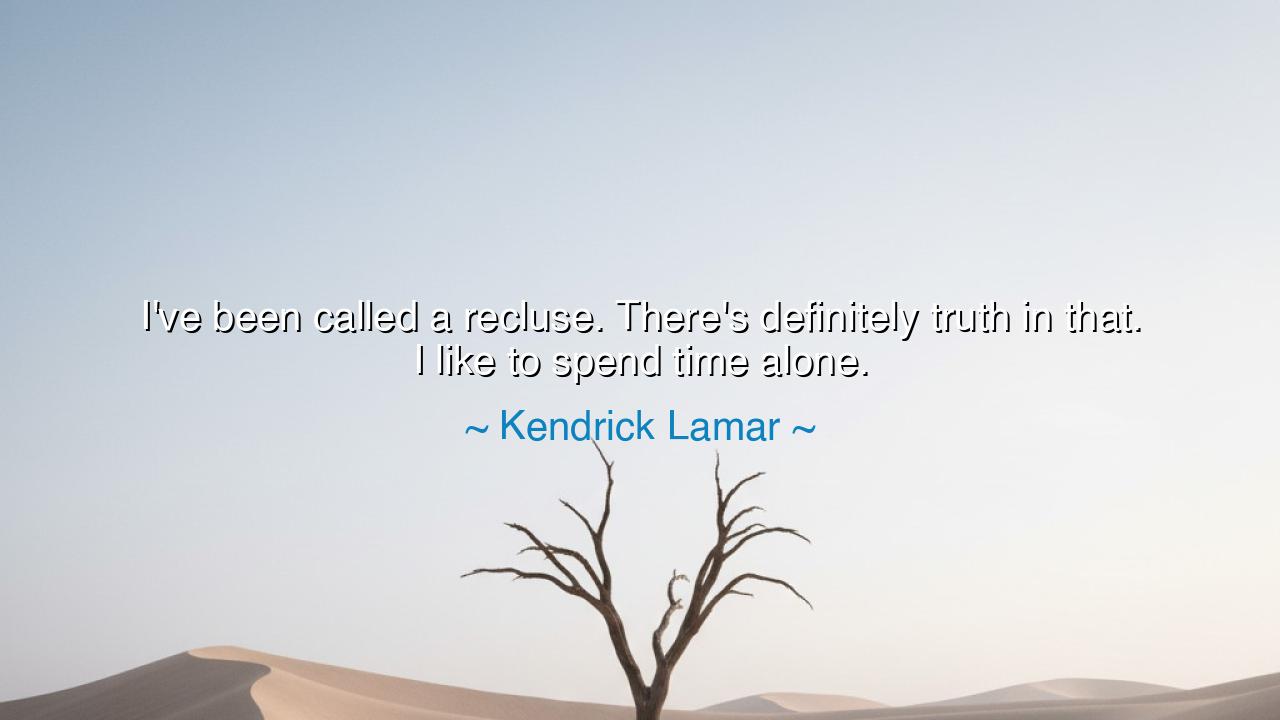
I've been called a recluse. There's definitely truth in that. I
I've been called a recluse. There's definitely truth in that. I like to spend time alone.






In the quiet shadows of the human soul, where the rush of the world cannot reach, there lies a truth that speaks to those who seek solitude and reflection. Kendrick Lamar, the voice of a generation, offers insight into this truth when he states, “I’ve been called a recluse. There’s definitely truth in that. I like to spend time alone.” These words reflect a deep understanding of the value and power of being alone, of finding strength and clarity in moments of isolation. In a world that often values constant connection and social interaction, Lamar’s admission to solitude stands as a quiet rebellion—a call to recognize the importance of self-reflection and the personal growth that comes from time spent alone.
In the ancient world, the great philosophers and thinkers understood the necessity of solitude for intellectual and spiritual growth. Socrates, whose name is synonymous with wisdom, spent much of his life alone, contemplating the nature of truth and virtue. He did not seek the distractions of the crowd but instead embraced solitude as a tool for self-discovery. In the stillness of his own mind, Socrates sought to understand the world, not through the opinions of others, but through his own observations and reflections. His reclusion, far from being a sign of weakness, was a path to greater wisdom and deeper understanding of both the self and the universe.
Similarly, the great mystics and spiritual leaders throughout history, from Buddha to Jesus, spent significant time in solitude to deepen their connection to the divine. It is in the quiet moments of solitude that they were able to hear the voice of truth, to wrestle with the challenges of the soul, and to discover the deeper meaning of their lives. Jesus, retreating into the wilderness to pray, found strength and clarity in the silence, preparing himself for the monumental tasks that lay ahead. Solitude, for these figures, was not a withdrawal from the world but a means to fortify the spirit and gain greater insight into the nature of existence and purpose.
Kendrick Lamar’s statement mirrors this ancient tradition of solitude as a path to personal and creative growth. In his world of fame and success, where the world clamors for his attention, Lamar chooses to spend time alone, reflecting and creating. This choice speaks not only to his artistic process but also to his understanding of the need for inner peace and self-reflection. Just as the prophets of old sought solitude to listen to the deeper currents of life, Lamar seeks the quiet to channel his creativity and reflect on the complexities of his experiences. His reclusion is not a rejection of the world, but a way to better understand and, ultimately, shape it.
The lesson in Lamar’s words is profound: solitude is not to be feared or avoided. In a society that often praises constant activity and social engagement, we must learn to embrace the stillness, for it is in moments of solitude that we can connect most deeply with ourselves. It is in the silence that we can hear our own thoughts, understand our own desires, and reflect on the path we wish to walk. Just as the ancients turned inward to find the answers to life’s greatest questions, we too must spend time alone to find clarity, purpose, and truth.
The story of Leonardo da Vinci, whose genius in art and invention changed the course of history, also illustrates the importance of solitude. Da Vinci was not only a master of his craft but a man deeply connected to his inner world. He spent long hours alone, reflecting on nature, the human form, and the mysteries of the universe. It was in these moments of solitude that his most brilliant ideas emerged. Da Vinci’s life teaches us that creativity and innovation are often born from solitude, where the mind can roam free and ideas can flow without the constraints of external noise.
The key takeaway from Lamar’s words is that solitude is not merely an absence of people, but a space for growth, reflection, and creativity. It is through time spent alone that we can confront our own thoughts, develop our own ideas, and find the strength to navigate the complexities of life. Let us not fear being alone, but embrace it as an opportunity to deepen our connection with our true selves.
Let us take action: in our busy lives, let us carve out moments of solitude. Whether it be in quiet reflection, journaling, prayer, or simply being alone with our thoughts, we must remember that it is in these moments of peace that our truest self can emerge. Just as Lamar, Socrates, and Da Vinci found clarity in their moments of solitude, so too can we use the quiet to grow stronger, more creative, and more aligned with our purpose. Solitude is not something to be avoided, but a sacred space where we can find the clarity to move forward with strength, wisdom, and vision.






AAdministratorAdministrator
Welcome, honored guests. Please leave a comment, we will respond soon